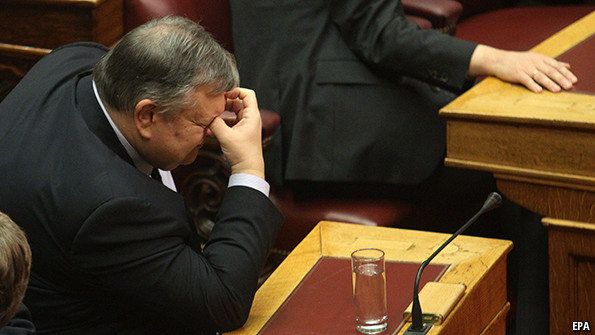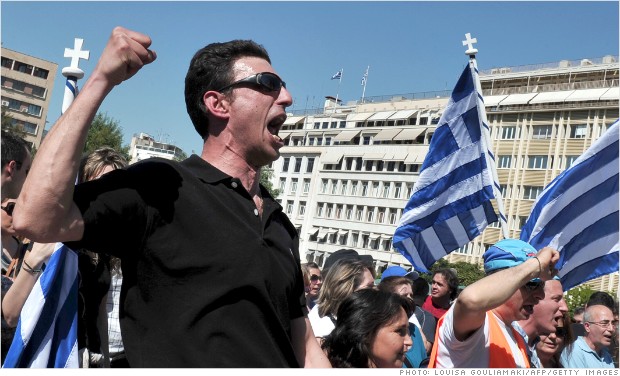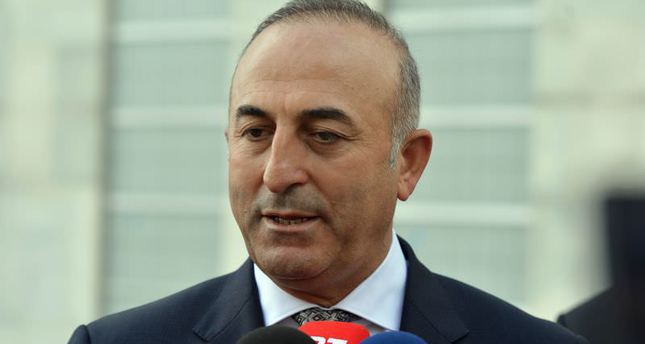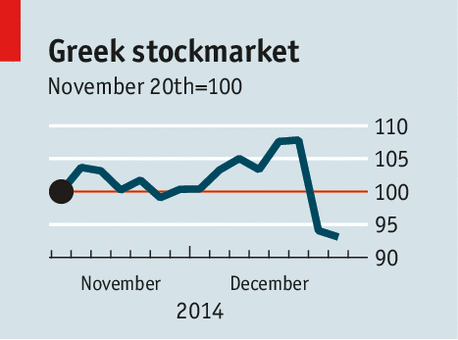By Giorgos Christides
Thessaloniki, Greece BBC
 Alexis Tsipras has warned the markets they will have to "dance to the tune" of a Syriza government
Alexis Tsipras has warned the markets they will have to "dance to the tune" of a Syriza government
A
large portrait of Marxist revolutionary Rosa Luxemburg hangs in the
Thessaloniki office of Nikos Samanidis, a founder member of Greece's
Coalition of the Radical Left, better known as Syriza.
With many Greeks exhausted by five years of recession, tax
hikes and record unemployment rates, Syriza and its firebrand leader
Alexis Tsipras are tipped to win the early elections that must be
called, according to the Greek constitution, if parliament fails to
elect a new head of state by 29 December.
"After decades on the defensive, the left is staging a
comeback. Not just in Greece, but in Europe and Latin America as well,"
said Mr Samanidis, a top official of Syriza in the country's second
city.
Alluring as it may prove to Greek voters, the prospect of a
leftist party coming to power in Europe's most indebted country is
rattling the markets and European capitals.
Greek Prime Minister Antonis Samaras has warned
parliamentarians that if they fail to elect a new president, Greece
could risk a disastrous exit from the eurozone.
 Syriza won the European elections in Greece in May and are still leading in the opinion polls
Syriza won the European elections in Greece in May and are still leading in the opinion polls
The Athens Stock Exchange posted its biggest drop on record on 9
December, while borrowing costs for Greece have skyrocketed amid the
political uncertainty.
A number of senior European officials have urged voters to
support the ruling coalition of conservatives and social democrats. "I
wouldn't like extreme forces to come to power. I would prefer if known
faces show up," European Commission President Jean-Claude Juncker
recently told journalists, commenting on the chances of a general
election in Greece.
'Still radical'
While Rosa Luxemburg may adorn its offices, Syriza is not the
revolutionary force that her Spartacists represented in Germany a
century ago.
As the party draws closer to real power, it has softened many
of its sharp edges and tried to build bridges, even with City hedge
funds. Syriza is vowing to keep Greece within the eurozone and has
reassured creditors it will refrain from unilateral decisions on the
debt issue.
 A portrait of Marxist revolutionary Rosa Luxemburg in Nikos Samanidis' office indicates Syriza's political leanings
A portrait of Marxist revolutionary Rosa Luxemburg in Nikos Samanidis' office indicates Syriza's political leanings
Far from being destructive, Syriza's political proposals offer a
reasonable way out of austerity and a chance to replace existing
bailout laws with new ones, argues political economist Yanis Varoufakis.
"The first priority is renegotiating with creditors. Syriza
needs to speak the language of truth about the continuing triple
bankruptcy of the country - public debt, banks, private sector -
something no Greek government has done so far. Then they need to table
positions that the average German will find reasonable."
Continue reading the main story
“Start Quote
The top 10%, yes, they obviously do have reason to worry”
Nikos Samanidis
Syriza founder member
But Syriza and its 40-year-old
leader are still seen by many in the Greek and European establishment as
unknown and potentially dangerous quantities.
Mr Tsipras has warned markets that they "will have to dance
to the tune" of his government, while Syriza promises to boost public
spending, reverse privatisations, increase salaries and pensions and
repeal bailout laws liberalising the markets.
Nikos Samanidis emphasises that the prospect of power has not
blunted the radical nature of the party, despite its meteoric rise from
relative obscurity to frontrunner in little over two years.
"The rich, the elites, the markets, the super-rich, the top 10%, yes, they obviously do have reason to worry," he says.
"They will lose their privileges. Our voter base has expanded
greatly, but the grassroots, radical nature of Syriza has been
preserved thanks to the crisis. Our party has not and will not sever its
ties with the streets, with the social movements it arose from."
Syriza was formed in 2004 as a coalition of groups and
parties ranging from Maoists to greens. Before 2012 its electoral appeal
had been of little consequence for Greece's political system, never
exceeding 5% of the vote. It only became a unitary party in 2013.
But in 2012, in the apogee of the Greek crisis, Syriza took
the political establishment by storm, polling close to 27% in the June
general elections and eclipsing the social democrats to become the
second-largest party in the country. In the European Parliament
elections in May 2014, Syriza emerged victorious, polling close to 27%
of the vote.
No fear
 Colleagues see him as an ordinary, decent man while critics see him as arrogant
Colleagues see him as an ordinary, decent man while critics see him as arrogant
Mr Tsipras, the youngest political leader in Greece's history,
was instrumental in transforming Syriza from an also-ran to a potential
ruling party. Known for his rhetorical skills, his dislike of neckties
and his good looks, Mr Tsipras rose to the leadership of Syriza in 2008
and was elected to parliament in 2009.
"The economic crisis and the collapse of traditional parties
certainly helped Syriza grow its influence, but it was Alexis Tsipras
who catapulted the party," says Christoforos Vernardakis, Professor of
Political Science at Aristotle University of Thessaloniki and founder of
the public opinion survey company VPRC.
"This happened because Tsipras is young and knows no fear. He
took a defensive left and turned it into a credible choice for
government."
Despite his undoubted charisma, several Syriza members and
officials who know Mr Tsipras personally describe him as "an everyday,
decent person".
"With Alexis we go a long way back. We used to hang out and I
can tell you he is a normal, decent guy. Even as a leader, he likes
collective processes and decisions," said Mr Samanidis.
Critics, on the other hand, see Mr Tsipras as arrogant,
inexperienced and power hungry - a maverick politician willing to
sacrifice Greece to rise to power.
Long-time friend Nikos Karanikas rejects this description of Syriza's "comrade-president".
"Although it was clear from the start he was a leader, it
took some encouragement from us for him to come forward and take the
lead - he had no lust for power," said Mr Karanikas, a member of the
political bureau of Syriza's largest constituent group, Synaspismos.
 EU Commission president Jean-Claude Juncker said he would prefer Greece to maintain its political status quo
EU Commission president Jean-Claude Juncker said he would prefer Greece to maintain its political status quo
Tsipras, he argues, still lives in the middle class Athens
neighbourhood of Kypseli, and cut his professional teeth while working
as a civil engineer. He was one of the "700-euro generation" of youth
who struggled to advance beyond the average Greek salary.
'Operation of terror'
Eager as they are for a historic victory for the left, Syriza
officials are also prepared for a long struggle. "My generation has a
chance now with Syriza to stop the disaster. We have no fear of
governing," said Mr. Karanikas.
The party's first battle starts on Wednesday, in the first ballot of the parliamentary election for president.
Some analysts predict that renewed fears for Greece's future
in the eurozone will convince enough MPs to vote for the government's
presidential candidate; or, in the event of a general election, convince
enough Greeks to turn the tide in favour of the ruling coalition.
Alexis Tsipras has denounced this tactic as an "operation of terror" by Prime Minister Samaras and European officials.
Some Greeks seem to believe the danger is real, with weekend polls showing that Syriza's lead has narrowed slightly.
But others, like Panagiotis Makridis, a waiter at a Greek
coffee shop, are enraged by what they say is blatant scaremongering from
the government, Brussels and European capitals.
"So Jean-Claude Juncker is telling me who to vote for? I didn't plan on voting Syriza, but now I just might."













![[linked image]](http://newpost.gr/storage/photos/w_800px/201412/ypov.jpg)


















